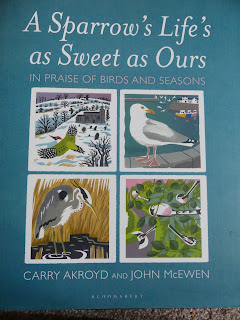I don't see so many birds on the feeders here as I did at Clay Cottage or at the smallholding and I stopped feeding peanuts as they just went mouldy in all the wet weather we have had.
But one day last week the Long-Tailed Tits arrived all at once - as they do, and having found out why I couldn't get my new camera to focus on zoom (thanks to my son), I was able to get a nice photo.
I wondered what the illustration was for Long Tails in this book which is always on the shelf beside me
And this was it..............
On the page facing each illustration is a description and information about the birds featured.
'Tit' is short for 'titmouse'. One of the first signs of autumn is the visit of a family of long-tailed tit-mice, colloquially 'bumbarrels', to the birdbath. In they swoop .......................Then, as suddenly, they move on, acrobatically upending as they make their busy way from one tree's canopy or hedge to the next.
The country poet John Clare wrote a whole poem about the nest of the Long-tailed Tit which is a "domed marvel of avian architecture".
The oddling bush, close sheltered hedge new-plashed,
Of which spring's early liking makes a guest
First with a shade of green though winter-dashed
There, full as seen, bumbarrels make a nest
Of mosses grey with cobwebs closely tied
And warm and rich as feather-bed within,
With little hole on it's contrary side
That pathway peepers may no knowledge win
Of what her little oval nest contains -
Ten eggs and often twelve with dusts of red
Soft frittered -
- and full soon the little lanes
Screen the young crowd and hear the twitt'ring song
Of the old birds who call them to be fed
While down the hedge they hang and hide along.
(From Bumbarrel's Nest)
The nests have been deconstructed and found to contain as many as 2,300 feathers and covered with up to 3,000 flakes of lichen and all constructed in as few as 3 days - busy little birds!
Back Tomorrow
Sue




Your photographs are brilliant - and, like the artwork from the book - they capture the busy birds working together. What a joyful scene!
ReplyDeleteSuper photos and thanks for the information - they are very cheering. xx
ReplyDeleteI love long tailed tits. They chase through a garden in a small twittering mass, looping as they fly. They seem like they are in their forever baby stage.
ReplyDeleteWe have a gang of them that visit our coconut feeder each day. A lovely sight.
ReplyDeleteLovely information and illustrations - great photos btw. What a lovely poem about their nest that John Clare wrote. Sums it up perfectly.
ReplyDeleteWe have them here too, usually at the feeder in the front yard.
We keep 2 books near our garden patio doors, one on British birds the other on British wildlife with a pair of binoculars, just in case.
ReplyDeleteYour photo is lovely and clear, aren't they lovely birds. We seem to have mostly wood pigeons and starlings on our bird table at the moment. All the small birds seem to prefer the hedgerows along the canal tow paths.
ReplyDeleteWhat a picture they make on a bird feeder. Adorable birds.
ReplyDeleteLovely pics and a great poem
ReplyDeleteAlison in Wales x
Wonderful! I love it when a long-tailed tit family descends on the garden. They're so pretty and busy. And last week I sat and watched a green woodpecker amble round the lawn looking for whatever it is they look for. Much more interesting than the telly!
ReplyDeleteThat's a great photo, Sue, and that illustration matches your photo so well. How fun that the show up all at once like that!
ReplyDeleteThey are lovely birds. We don't have them here in the states though we do have the titmouse and chickadees which both love my feeders.
ReplyDeleteThat is a great photo of the birds at your feeder. There must be a few nests nearby. Their nest is a real architectural marvel. I'd love to see a nest. In the Spring you might even see their young.
ReplyDeleteWonder photo! We are not getting as many birds as we did last winter. Not sure if it is because we did not feed this summer because of the bears.
ReplyDeleteBut the woodpeckers are around.
Cathy
Lovely post, thank you. I don't think we have this species. And John Clare, such a luminous poet and such a sad life. Thank you for that poem.
ReplyDeleteYou do such a great job of your photo's. Not many birds around here lately and I really do not know why.
ReplyDeleteGod bless.